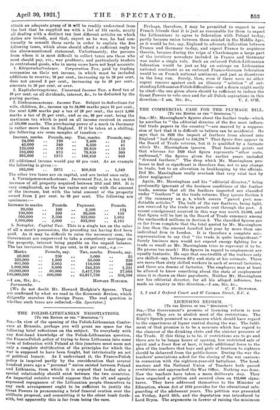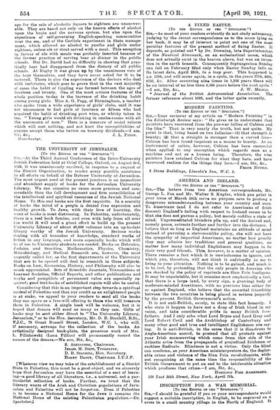LICENSING REFORM.
[To THE EDITOR 07 THE " SPECTATOR.") Sia,-The Government's promise of licensing reform is now explicit. They are to abolish most of the restrictions. The King's Speech promised us a measure which should have regard to the experiences of liquor control during the war. The fulfil- ment of that promise is to be a measure which has regard to the clamour of the drinking clubs and the sinister pressure of the Trade. If this thing is to be, if restrictions are to go and there are to be longer hours of opening, less restricted sale of spirit and a freer flow of beer, it lends additional force to the plea of the teachers that boys and girls of fourteen to eighteen should be debarred from the public-house. During the war the teachers' associations asked for the closing of the wet canteens in connexion with the eighteen-year-old battalions. The head- masters and the National Union of Teachers both passed resolutions and approached the War Office. Nothing was done. Now the teachers have taken a more deliberate step. They have organized a petition and secured close on 116,000 signa- tures. They have addressed themselves to the Minister of Education, whose Act of 1918 provides for the educational safe- guarding of the adolescent years. The petition was presented on Friday, April 15th, and the deputation was introduced by Lord Bryce. The arguments in favour of raising the minimum age for the sale of alcoholic liquors to eighteen are unanswer- able. They are based not only on the known effects of alcohol upon the brain and the nervous system, but also upon the experience of self-governing English-speaking communities over the sea, and of the Carlisle experiment in State manage- ment, which allowed no alcohol to youths and girls under eighteen, unless ale or stout served with a meal. This exception in favour of ale with meals was probably inserted because of the former practice of serving beer at dinner in the public schools. But Dr. David had no difficulty in showing that prac- tically beer had disappeared from the dietary of all public schools. At Rugby it was given up by the unanimous vote of the boys themselves, and they have never asked for it to be restored. There is also the experience of the doctors who deal with inebriates, which goes to prove that in the vast majority of cases the habit of tippling was formed between the ages of fourteen and twenty. One of the most serious features of the whole position to-day is the increase of the drinking habit among young girls. Miss A. G. Pegg, of Birmingham, a teacher who spoke from a wide experience of girls' clubs, said it was not uncommon to find girls of fourteen or fifteen who had acquired the habit of drinking port wine, or whisky taken in tea. " Young girls would sit drinking in smoke-rooms with all the unconcern of men." Here is a measure of social reform which will cost nothing, and not hurt the susceptibilities of anyone except those who batten on brewery dividends.—I am.



































 Previous page
Previous page